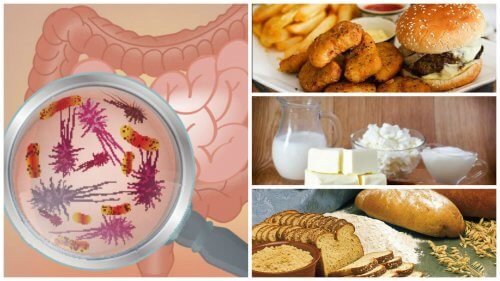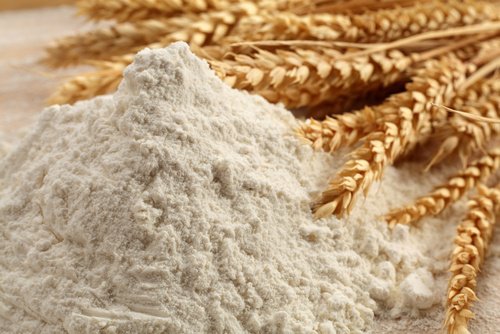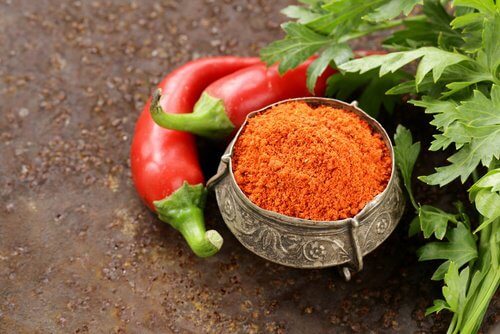Intestinal Health: 7 Foods That Are Bad For Your Gut


Reviewed and approved by the pedagogue in physical education and nutritionist Elisa Morales Lupayante
Your intestines play a very important role in your health. After all, they help your body absorb nutrients and remove waste. However, did you know that they also host healthy bacteria? They are key to maintain your intestinal health. Find out more in this article.
Millions of bacteria live in your intestines. They’re actually essential for good digestion because they’re in charge of decomposing certain substances that your body can’t digest by itself.
Also, they help produce certain essential vitamins. As if that weren’t enough, they give your body energy and strengthen your immune system. But, the problem is that sometimes bad eating habits can kill those bacteria. As a result, your bowels cannot do their job well.
To make matters worse, many people don’t know which foods are harmful. They don’t know why eating them can lead to these negative effects. That’s why we’re taking this opportunity to reveal the 7 most harmful foods for your intestines and why you should reduce their consumption as much as possible.
1. Enemies of your intestinal health: Grains high in gluten

While the fiber in some whole grains can improve intestinal function, the gluten in refined grains can cause problems. This is true because if this protein is not digested correctly, it can lead to certain allergies and adverse reactions.
Also, eating too much of it increases inflammation levels. If left uncontrolled, it can trigger autoimmune illnesses such as:
- Diabetes
- Arthritis
- Alzheimer’s
- Lupus
- Fibromyalgia
- Multiple sclerosis
- Crohn’s disease
Want to learn more?: Is There a Connection between Gluten and Fibromyalgia?
2. Red meat
Regularly eating red meat increases your risk of gout. Also, it can affect your body tissues, increasing inflammation. In addition, red meat is harder to digest in comparison to lean meats.
Since it slows down digestion, it can also lead to digestive symptoms like bloating and gas. In addition, red meat changes the pH of your intestines. This means it lowers levels of friendly bacteria and thus increases your risk of infection.
3. Fatty, fried food

Fried and high-fat foods can cause metabolic disorders and weight problems in the long-term. In the short-term, they irritate your intestine and increase acid levels in your stomach. They can cause problems like acid reflux, too.
People with irritable bowel syndrome, gastritis, and other digestive system disorders should avoid fried and high-fat foods. Although they might taste good, they often bring more trouble and are thus best avoided.
4. Dairy
While dairy products can provide nutrients that your body needs, people who are lactose intolerant should avoid their consumption. They’re tasty and are found in many dishes that you probably eat all the time, but it has been proven that they are responsible for many intestinal issues.
The fat, lactose, and proteins in dairy products directly affect intestinal health. They alter the microbiome and make it harder to remove waste. They are also related to inflammation and common problems like constipation and diarrhea.
5. Spicy foods

Hot peppers add a special touch to your food and even contain powerful antioxidants. However, eating them can cause serious swelling in your intestinal lining. This is especially true for people who already have a digestive issue.
As a result, you’ll experience more acid reflux, heartburn, and gastritis. If you are often suffering from these issues, try eating less spicy foods and see if the problem improves.
6. Coffee and soda
Coffee and soda are associated with acid reflux and intestinal inflammation. These beverages relax the esophageal sphincter, which makes it easier for stomach acid to come up.
The high amounts of sugar and additives also interfere with intestinal health. It can sometimes lead to diarrhea and serious abdominal pain. What is more, if these beverages have artificial sweeteners, they kill the bacteria in your gut and damage your intestinal health.
Check out this article: Discover: 6 Habits that Cause Abdominal Inflammation
7. Canned and processed food

Supermarkets are overrun with a wide variety of canned and processed foods. These are often prepared in a way that takes away from their nutritional quality. Many people see them as a good, quick option since they do tend to taste good and are easy to make.
However, what the industry doesn’t want people to know is that they are very low in essential nutrients. Instead, they’re full of additives that affect your intestines as well as the rest of your body.
Consuming additives is linked to the risk of developing metabolic illnesses, irritable bowel syndrome, and several types of cancer. Although they help preserve food, the drawbacks are much greater. Try to avoid them!
Do you eat any of the above foods? If so, try to change your diet, little by little, to make it more friendly to your gut. Try to eat more organic foods, especially fruits, vegetables, and whole grains. We are sure you’ll feel much better in no time!
All cited sources were thoroughly reviewed by our team to ensure their quality, reliability, currency, and validity. The bibliography of this article was considered reliable and of academic or scientific accuracy.
- DIETAS EMPÍRICAS PARA EL TRATAMIENTO DEL SÍNDROME DEL INTESTINO IRRITABLE (n.d.). Asociación española de gastroentología.
http://www.aegastro.es/sites/default/files/archivos/documento-grupo/sindrome_colon_irritable_-_baja_en_fodmaps.pdf - Mayo Clinic Staff. (2017). Food allergy.
mayoclinic.org/diseases-conditions/food-allergy/symptoms-causes/syc-20355095 - ‘The way to a man’s heart is through his gut microbiota’–dietary pro- and prebiotics for the management of cardiovascular risk (2014). Tuohy KM, Fava F, Viola R.
https://www.ncbi.nlm.nih.gov/pubmed/24495527 - Conlon, M. A., & Bird, A. R. (2014). The impact of diet and lifestyle on gut microbiota and human health. Nutrients, 7(1), 17-44. doi:10.3390/nu7010017
https://www.ncbi.nlm.nih.gov/pmc/articles/PMC4303825/ - Rethinking fiber and hydration can lead to better colon health. (2013).
health.harvard.edu/diseases-and-conditions/rethinking-fiber-and-hydration-can-lead-to-better-colon-health - Zhang et al. (2015). Impacts of gut bacteria on human health and diseases. DOI: .
10.3390/ijms16047493
This text is provided for informational purposes only and does not replace consultation with a professional. If in doubt, consult your specialist.








